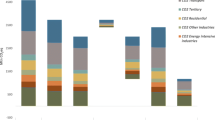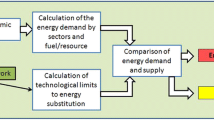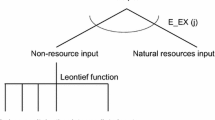Abstract
This paper uses the OECD’s global recursive-dynamic general equilibrium model ENVLinkages to examine the mid-term economic consequences and the optimal energy supply mix adjustments of a simultaneous implementation of i) a progressive fossil fuel subsidy reform in emerging and developing economies and ii) a progressive phase out of nuclear energy, mostly affecting OECD countries, China and Russia. The analysis is then transposed in the context of climate change mitigation to depict the corresponding implications for CO2 emissions, to assess the interactions between the two energy policies, and to derive how the associated costs are affected by the different policies. The phase-out scenario projects a nuclear capacity halved by 2035 as compared to the Baseline, corresponding to $120 billion losses in value-added of the nuclear industry for that year. The nuclear phase-out leaves GDP and real household consumption marginally affected in energy importing countries. A multilateral subsidy reform is more likely to affect international fossil fuel prices and alter patterns of global energy use. The fossil fuel subsidy reform, when implemented together with nuclear phase-out, more than offsets negative consequences on household consumption but still leads to a decrease in global CO2 emissions. The combined policies help save the equivalent of current energy consumption in the Middle East. Combining a climate policy, an effective fossil fuel subsidy reform, even with a lower nuclear share in the power mix, brings about multiple benefits to OECD countries which reduce their energy bill and achieve large climate change mitigation at lower cost.






Similar content being viewed by others
Notes
Ellis (2010) gives a comprehensive overview of modelling and empirical studies to study the effects of the fossil fuel subsidy reform.
Bazillian and Onyeji (2012) point at infrastructural and institutional deficiencies which are not appropriately factored into the decision-making process of reforming the support to fossil fuel consumption and which may make these policies sometimes ineffective. Other distributional impacts within different income groups shall be carefully considered when implementing such policies.
The IEA dataset contains fossil-fuel subsidies to end-users in 35 non-OECD countries in addition to two OECD countries, Mexico and South Korea.
In our modelling framework, the nuclear phase-out takes the form of a constraint (i.e. an upper bound) on the activity level of the nuclear sector.
Deviations of all GHGs emissions by country in the fossil fuel subsidy removal scenario relative to the Baseline are provided in the Supplementary Material.
References
Bauer N, Brecha RB, Luderer G (2012) The economics of nuclear power and climate change mitigation policies. ProcNatl Acad Sci U S A 109(42):16805–16810
Bazillian M, Onyeji I (2012) Fossil fuel subsidy removal and inadequate public power supply: Implications for businesses. Energ Policy 45:1–5
Bretschger L, Ramer R, Zhang L (2012) Economic effects of a nuclear phase-out policy: a CGE analysis. CER-ETH Working Paper 12/167
Burniaux JM, Chateau J (2011) Mitigation Potential of Removing Fossil Fuel Subsidies: a General Equilibrium Assessment, OECD Economics Department Working Papers, No. 853. OECD Publishing, Paris
Burniaux JM, Chateau J, Sauvage J (2011) The trade effects of phasing out fossil-fuel consumption subsidies, OECD Trade and Environment Working Paper, No. 2011/05. OECD Publishing, Paris
CDC Climat (2012). German nuclear phase-out implications for the EU-ETS. Climate Brief
Chateau J, Dellink R, Lanzi E, Magné, B (2012) An overview of the OECD ENV-Linkages model—version 3, OECD Environment Working paper, OECD Publishing, Paris, forthcoming
Chateau J, Magné B (2013) Economic implications of the IEA Efficient World Scenario, OECD Environment Working paper, OECD Publishing, Paris, forthcoming
Ellis J (2010) The Effects of Fossil-Fuel Subsidy Reform: a review of modelling and empirical studies. For the Global Subsidies Initiative (GSI) of the International Institute for Sustainable Development (IISD), Geneva
Keppler JH (2012) The economic costs of the nuclear phase-out in Germany. NEA News, Vol. 30 n°1.
Koplow D (2012) Phasing Out Fossil-Fuel Subsidies in the G20: A Progress Update, Earth Track Inc. and Oil Change International, November
Kurosawa A, Hagiwara N (2012) Long Term Energy System Analysis of Japan after March 11, 2011. The Institute of Applied Energy
International Energy Agency (IEA) (2011) World Energy Outlook. IEA Publications, Paris
International Energy Agency (IEA) (2012) World Energy Outlook. IEA Publications, Paris
IEA, OPEC, OECD, World Bank (2010) Analysis of the Scope of Energy Subsidies and Suggestions for the G-20 Initiative, joint report prepared for submission to the G-20 Leaders’ Summit (Toronto, June 2010)
IEA, OPEC, OECD, World Bank (2011). Joint report by IEA, OPEC, OECD and World Bank on fossil-fuel and other energy subsidies: An update of the G20 Pittsburgh and Toronto Commitments, Prepared for the G20 Meeting of Finance Ministers and Central Bank Governors (Paris, Oct. 2011) and the G20 Summit (Cannes, Nov. 2011).
Intergovernmental Panel on Climate Change (IPCC) (2007) Climate Change 2007. Synthesis Assessment Report, Working Group III
OECD (2010) Projected Costs of Generating Electricity—2010 Edition. International Energy Agency / Nuclear Energy Agency Publications, Paris
OECD (2012) OECD Environmental Outlook to 2050: the consequences of inaction. OECD Publishing, Paris
OECD (2013) Inventory of Estimated Budgetary Support and Tax Expenditures 2013. OECD Publishing, Paris
Disclaimer
The views expressed in this paper are those of the authors and do not necessarily represent the views of the OECD or of its member countries.
Author information
Authors and Affiliations
Corresponding author
Additional information
This article is part of the Special Issue on “The EMF27 Study on Global Technology and Climate Policy Strategies” edited by John Weyant, Elmar Kriegler, Geoffrey Blanford, Volker Krey, Jae Edmonds, Keywan Riahi, Richard Richels, and Massimo Tavoni.
Electronic supplementary material
Below is the link to the electronic supplementary material.
ESM 1
(DOCX 346 kb)
Rights and permissions
About this article
Cite this article
Magné, B., Chateau, J. & Dellink, R. Global implications of joint fossil fuel subsidy reform and nuclear phase-out: an economic analysis. Climatic Change 123, 677–690 (2014). https://doi.org/10.1007/s10584-013-1030-y
Received:
Accepted:
Published:
Issue Date:
DOI: https://doi.org/10.1007/s10584-013-1030-y




